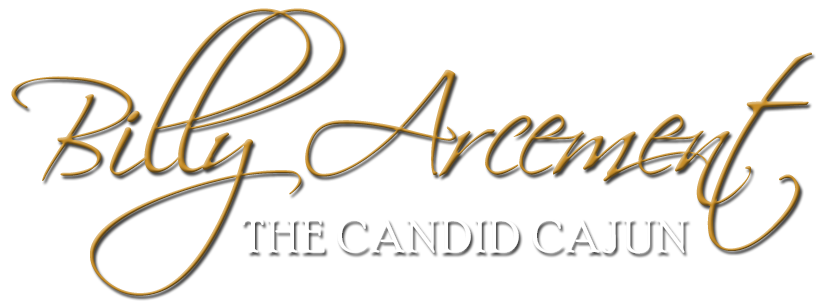Perhaps it’s my heritage. Perhaps it’s just who I am. But an important part of my life is to face truth. Deceit of self or others gains nothing. Truth is the key to opening the cell of our life filled with problems and obstacles. A part of my Catholic faith advocates confessing our sins. Wow, what a truth moment that is. To admit your flaws to someone takes courage. But the process can be freeing allowing growth and improved performance.
Confession implies candor. Evading a conversation on what needs improvement never leads to greater achievements. I’d like to think that my Cajun heritage taught me that facing truth is a strengthening action. I believe being candid helps me and helps those with whom I’m conversing.
I want to take that conversation a step further. I'm come to appreciate the value of candor. I’m appreciative of the readers who take the time to offer their positive comments on my writings. They so energized me that I’ve created a program on candor. I already booked an engagement on the topic. It’s hot in the workplace.
An open, honest, sincere and caring mindset are the drivers of candor. It’s not aggressive to the point where it becomes demeaning. It’s about discussing actions, not the person. As you lead or manage employees, don’t drop candor. It should be your best friend. Employees will come to appreciate candor done with a sincere and caring heart.
Think about the last performance discussion you had with an employee. Here are a few questions to help jump start your thinking. How would you rate the conversation? Did you start the conversation with “good things?” Were you open to feedback from the employee? Were you specific or vague with your words? Was the session planned or did you wing it? Could you listen without bias? Were you pushed beyond your comfort zone? Were you transparent?
This is a start of the process to develop the personal candor necessary to grow employee skills. Please allow me to change your title from manager / supervisor to “coach.” I’m endeared to that title. I wore it when I was a high school coach. There is something warm and fuzzy with it. For me, it means I’m a willing listener while being a demanding teacher.
Coaching is a short-term, almost instantaneous correction of performance. It’s a process that involves monitoring the performance of a skill or task. Then, you give feedback on how to improve. The desired outcomes of the coaching process are self-sustaining actions. It’s about creating the ability to self-correct. It’s about making performance efficient enough to win. In corporate settings, coaching has the same outcomes.
The greatest coaches have a firm grasp of reality and have a fix in mind. They have the ability to see reality and fix flaws present. They are candid but not always non-aggressive. Not suggesting yelling at their players is how you should manage your employees. I’m advocating that you grow your ability to always see reality. Grow your ability to correct actions moving in the wrong direction. Become capable of giving specific instructions that will sustain efficiency. Last, become capable of sharing with candor. No need to mislead an employee with the wrong information.
Some believe the art of candor is a missing element in the workplace. Strong managers insist on candor. They welcome a “bad” story. It’s truth time again. When you remove the fear of being candid, information will flow like Niagara Falls. And the energy from this free-flowing water will power and nourish the seeds of success.
My recommendation is that your organization establish a candid culture. In this environment, conversations are real. No falsehoods allowed! Candid conversations in any culture don’t need extensive dialog. Remove the “flowering language” often designed to hide the real message. It’s about a conversation offering solutions and performance improvements. It’s always about truth! It’s always about caring!
We Cajuns enjoy life and living large. Good times comprise cultural customs. But Cajuns are also known for their candor. We care, we love. But we tell it like it is. If you don’t believe me, just listen to the fan conversations following an LSU football game. Every fan knows why LSU lost the game better than the coaches. I suspect this is a rather common reaction from fans everywhere. Say what you want about football. You just can’t say fans lack candor.
Straightforward dialog is the only way to make improvements in performance. There is no sugar to coat words. It’s honest dialog. It’s direct. It’s intended to help. In a team atmosphere straightforward dialog can be energizing. If the fear of sharing the truth stifles your team, nothing good happens. Productivity will diminish. Morale will sink like the Titanic. And, to no surprise, employees abandon the team and move on.
Insecurities are the antithesis of candor. Confidence shrinks as insecurities rise. Such an environment breeds selfishness. People are more concerned with their own survival; they have little concern for others. It’s self-centered, not other-centered. It’s about me, not you. Dishonesty permeates dialog. Evasiveness replaces eagerness. Gloom and doom cloud the future of the vision. Employees lose sight of their potential greatness and sink into the “funk” of failure.
In an interview shortly after he left GE, Jack Welch talked about candor. He said, you get the behavior you reward. If you reward candor, you will develop a culture of candor. Welch mentions trust and transparency as behaviors great corporations strive to establish. He said, a lack of candor will slow you down and won’t bring improvements to the workplace.
Jack Welch was clear; candor was critical for their successes. Perhaps, it’s time we all give candor a chance to change our culture. At least, that’s what this Cajun thinks!
